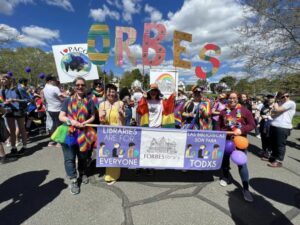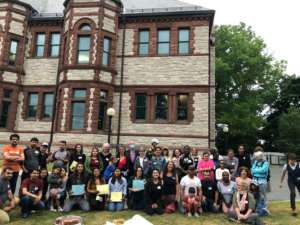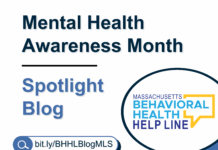At the heart of our mission and as a priority in our strategic plan, the Massachusetts Library System (MLS) supports our members initiatives focused on diversity, equity, inclusion, accessibility, and social justice (DEIASJ). In this interview series, the MLS is pleased to highlight the many ways that our libraries contribute to DEI in their communities. Lisa Downing, Director, at the Forbes Library in Northampton, will fill us in about how staff at the Forbes Library applied what they learned from MLS DEI programs.
Please tell us about how your library contributes to DEI (diversity, equity, and inclusion).

Lisa Downing: We review our policies and procedures to eliminate access barriers and implicit bias and have everyone on staff do anti-racism training. We review all job postings with an eye towards alternative qualifications and experiences, emphasize the value of world language ability, and we try to get postings in front of wider audiences. We have embraced equity as a core value for our library and use it as a benchmark and touchstone when we are making decisions and setting priorities. We have recently rebranded and our tagline is “Forbes For All” which has a nice ring to it and for us embraces the concept that this library is for everyone without exception.
What DEI services, resources, or programs provided by your library are you most proud of?
Lisa Downing: I am really pleased with how much more intentional we are at building a collection that includes creators and content that reflects a wider range of experiences and backgrounds. We are also promoting more diverse titles through displays, reader’s advisory, and programs.
We have had pronouns on our name tags and email signatures for a while and this continues to feel like the right choice. We also always have a contingent in our city’s pride parade and we pass out bookmarks featuring LGBTQ+ authors.
We have recently updated all of the signage in our children’s and young adult area to be bilingual (English/Spanish) and we are working on doing the same on our adult floors. We have added a Spanish language option to our phone tree as well.
Through a generous donation that was matched by trust funds, we purchased 11 pieces of artwork by black, indigenous, and people of color all with a connection to our local area. This work has made a huge visible difference on our walls that previously were dominated by traditional oil paintings including many portraits of white men. The artwork includes pieces by Mike Curato and Grace Lin. You can learn more on our website.

Last year and again this year we have been able to host the Center For New Americans year end celebration. This joyous event recognizes the academic achievements of the center’s students (many of whom regularly work at the library) and the diverse backgrounds of the students with a potluck that has the most delicious and authentic food from around the world.
Lastly, we have been focusing on accessibility for years now and continue to find ways to improve. Our latest project is to remove threshold lips on our bathroom doors and add automatic openers. Ben Kalish on our staff maintains a great page on our site about accessibility. It includes links to our home delivery options.
How did the DEI trainings offered by the Massachusetts Library System help you with your DEI efforts? What trainings were most useful?
Lisa: As a white CIS woman in our profession, I acknowledge the blinders that come with the privilege of representing the dominant culture. It is essential for me to keep growing and strengthening my skills and understanding. This work is difficult and something that I am committed to for the rest of my career.
I learned quite a bit from the empathy series that was offered in 2021 with Luis Ortega. Two quotes from that workshop highlighted in my notes are, “Libraries need to be supporting more than information. We need to think about making wisdom achievable.” and “Let’s move beyond statements to dialog.”
What advice would you give to a library interested to get more involved with DEI?
Lisa: Does your library have a defined set of values? If so, are they in alignment with DEI? If not, define your values to align with the principles of DEI. Then start looking at your policies. In the meantime, commit to learning and growing and provide opportunities for others in your organization to do the same.
Any final thoughts?
Lisa: I’ll close with a quote from Michael Bobbitt who is the Director of Massachusetts Cultural Council and was MLS’s annual speaker last year, “We need a revolution of imagination to contribute to the creation of an equitable and just society.”
Interview with Lisa Downing, Director, Forbes Library, Northampton
Interviewed by Michelle Eberle, Consultant, Massachusetts Library System


